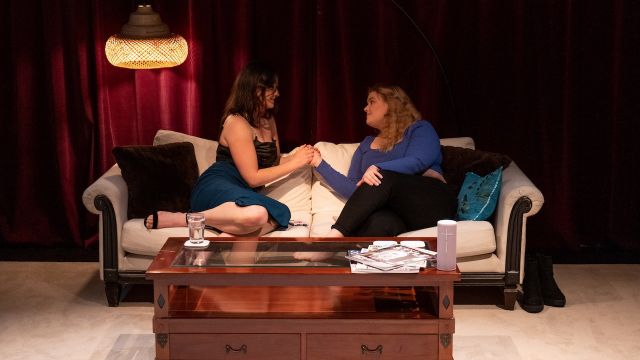Miss Julie (After Strindberg)
When we step out of the Autumnal chill of Goodwood Road into the Institute, we’re shown into the theatre – but instead of finding our seats in the auditorium, we’re led behind the stage curtain, and onto the stage itself. A lush white carpet that silently screams wealth separates the audience into two halves – it’s a traverse stage, so we’re staring across a sparsely decorated room to our fellow audience.
Julie is already there: lounging on the couch, finding the right angle for social media selfies, and it’s clear from how she is dressed and behaves that she never wants for anything. Kristine joins her – less certain, less provided for – but the two of them have an immediate familiarity that stretches their friendship back a long time.
After a dance at the club to thumping beats (evocatively designed by Reggie Parker), we’re back at Daddy’s house, with promises of staying over and arrangements made for Kristine’s partner to join them. Jean is an executive assistant for a travelling CEO, and he sneers at the chasm between him and his employer. But not his employer’s daughter: Julie. There is a frisson from the start from him, a lot more reckless flirting from her, but this seems to be the norm, so Kristine is unmoved.
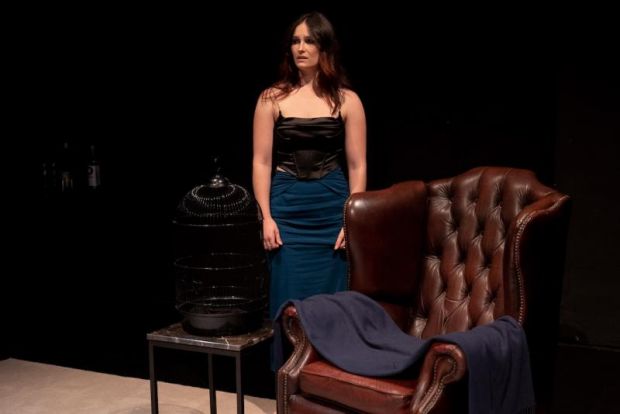
This mashed up triangle of relationships is fully explored and exploited in the eighty minutes we spend on stage – and we barely blink for a second of it. We are fully engaged with every word, each movement. We’re so close to the action we can hear them breathing and even this is a component of the performance: it’s used to indicate the character’s sense of calm – or more often, the lack of it – and it’s a small but brilliant piece of this mosaic of prime theatre.
The original Miss Julie was written by August Strindberg in 1888 as one of his early attempts to embrace naturalism on the stage, representing real people who have real problems – with life-changing solutions. Circumventing Danish censorship, the play was first previewed to a student audience in 1889, before its first official production in his home country of Sweden a full fifteen years later.
Director and writer James Watson has re-imagined Miss Julie for a Gen Z audience (though it’s thoroughly enjoyable and rewarding for all), and what a fabulous interpretation this is: we still have the class dynamics, survival instincts, pleasure versus pragmatic, impulse against plans. Yet here, Julie’s entitlement doesn’t come from aristocracy, but just the money her father earned; Kristine is a friend first, though still a servant of the house and follows the pecking-order; and Jean is no boot-cleaning valet, but an administrator who will never get to every e-mail. Relationships are defined by mobile phone apps and star-signs as much as their shared history, but nothing is toned down with Julie’s hedonism and recklessness.
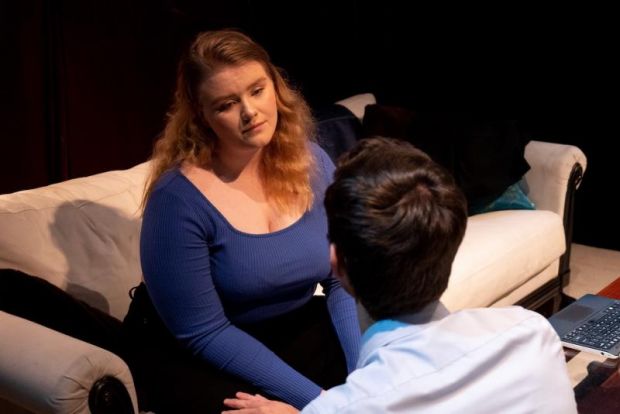
Kate Owen is breathtaking as Julie, our proximity to the actors shows every eye flinch, every trembling lip – and Owen holds her superior mask of certainty so brilliantly, until the other two see through it, to then reveal her real vulnerability. Because we’re so close, we have to move our heads from one performer to the other as they talk to each other, yet it’s difficult to take your eyes off Owen even when she’s not talking: you understand what’s being said to her just from how she reacts. Emelia Williams, as Kristine, is sublimely subtle. With more self-control and fewer extremes than Julie, Williams still finds ways to show the generational anxieties, as well as the complexities of a woman who truly understands what’s beneath her friend’s cocky exterior, even loving her ‘Scorpio Sister’ when betrayed by her. Williams is understating, and all the better for it.
Jean is played by a stoic Christian Bartlett, knowing how to stretch the silences just long enough, and in the intimate moments, he offers a crack of doubt as to who is seducing who. Bartlett is brilliant as a confused man with a foot in each of the two worlds he wants to inhabit, no less so when Jean is the pivot between the two women (and Watson’s staging of that moment is just superb). Yet it’s not just three fantastic individual performances: together, they work so well, as each pair adjacent to the third, but also when it’s just two – particularly Owen and Bartlett, who have outstanding chemistry from first flirt.
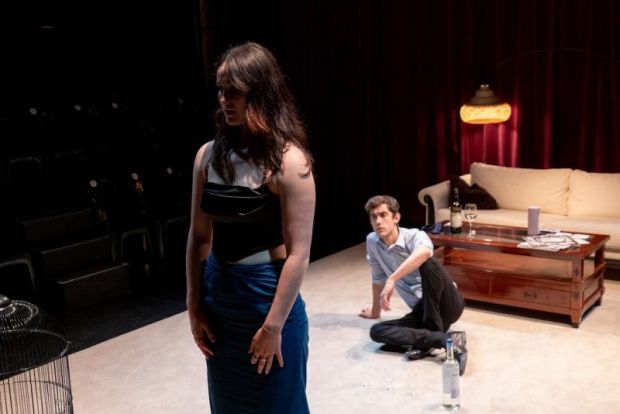
Each element of this production is outstanding, and this is achieved in no small part from Watson returning to previous collaborators: the soundscape from Reggie Parker bounces from club to couch, and he’s not afraid to turn it off so we can feel the tension in the stillness. Ruby Jenkins has designed a production that instantly juxtapositions wealth, taste – and practicality. After working together on Watson’s hometown return with ‘Home Thoughts’ (Adelaide Fringe 2022), these three clearly understand the needs and demands of each other. Monica Patteson’s stage management is also an integral part of this production’s success, with perfect cues of sound and light, and preserving momentum with never a wasted second between scene changes.
In his writing, Watson has pulled more than just themes from the 19th century original text – the interpretation isn’t superficial; it’s well-thought out. The localisation of Strindberg’s story does a lot to freshen the trope of love across the classes. Offering to make a morning coffee is familiar today, yet this action preserves the original text’s subservience in the three-way relationship. Metaphors of being caged and being lower than another person are conveyed both literally and with subtleties of speech, and it’s Watson’s own direction of his words that makes this work well. There are too many highlights to mention that would require a preceding ‘spoiler alert’, but one magnificent moment is when Julie asks Jean to help her with her shoes. Positioned provocatively on the carpet, she proffers her foot, and as the loyal servant, he places her shoe on her heel, before buckling it to her ankle. The themes of serving and caging scream, but this a mouth-drying seduction of a man – who is putting her shoes ON.
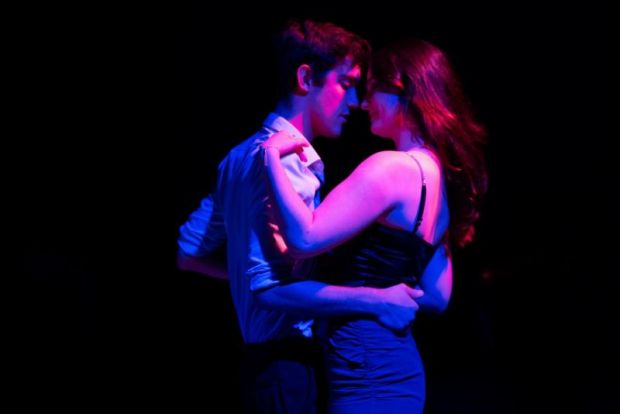
Preserving the naturalistic style in presenting Miss Julie (After Strindberg) means we’re dropped into a fast-moving situation without much prelude, and we’re pulled from it at the end without everything explained – but the final symbolism isn’t clear enough, without knowing Strindberg’s original ending. Though that means we’re still thinking and talking about the play all night and into the next day, so it’s a piece that keeps giving!
This is an extraordinary piece of theatre: Watson’s Gen Z re-imagining is smart, yet with humility and respect to the original text; and the traverse staging and Jenkins’ beautiful set design is intimate and immersive. Parker’s soundscape is vital and commanding in every beat and silence, the direction is clever but never self-aware, and all three performers are utterly captivating.
Mark Wickett
Photographer: Philippos Ziakas
Subscribe to our E-Newsletter, buy our latest print edition or find a Performing Arts book at Book Nook.

